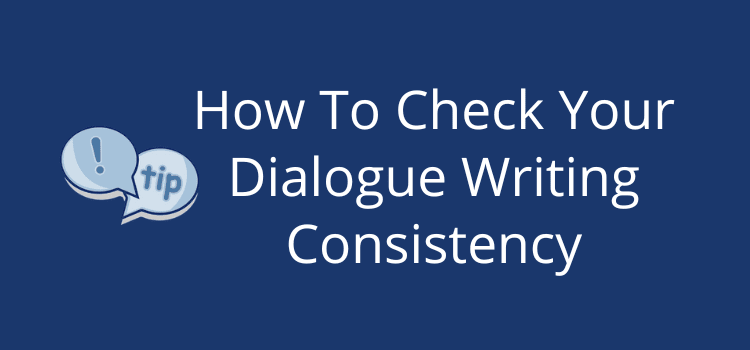
When it comes time to proofread and check all your dialogue writing in a manuscript, it can be quite a challenging process.
Because there are so many elements, it’s also extremely time-consuming.
Yes, you need to check your grammar, vocabulary, and punctuation when editing a book manuscript.
But above all else, consistency in dialogue is one of the most important points to check.
How to check consistency in dialogue
Dialogue writing is complex because it contains so many parts.
Even a very short line needs quotation marks, a tag, correctly placed punctuation, and capitalization.
Then, there is grammar, spelling, adverbs in tags, and tag placement, either before or after.
On top of these issues, however, some are not so easy to check.
Your consistency of use in your dialogue is one of them.
Are all your quotation marks the same, or are some straight and some curly?
It’s really hard to check all your dialogue for this point.
You need to keep reminding yourself to check every single one when proofreading.
Another tough one is overused tags. Sure, said is fine, always.
But how many times do you use cried or screamed? Maybe too many.
How to check your consistency and accuracy
The best way is to make a list.
Think about what you need to check before you start proofreading or editing.
Keep it next to you when you begin.
Your list could look like this.
1. Check quotation marks are all double curly.
2. Check commas are inside the last quotation mark.
3. Check adverbs in tags.
4. Check tags other than said.
5. Check the spelling of character names.
Now, you have a prompt to remind you whenever you get to lines of dialogue.
You might have other issues you can add to the list above.
However, usually, the most critical area is dialogue punctuation.
It’s so easy to miss errors with commas and quotation marks.
Accurate proofreading takes a lot of concentration, so perhaps do it in stages of only one or two chapters a day.
Is there an easier way to check dialogue?
Yes, there is, and I use it all the time because it makes life so much easier to find inconsistencies in dialogue.
Whenever I have to check a manuscript with dialogue, I use ProWritingAid.
For sure, there are other terrific grammar checkers.
But this is the best one, in my experience, because it can quickly locate the hard-to-find errors in dialogue.
I use three reports to do my checks—Grammar, Consistency, and Dialogue.

The reports are all on the main menu, so it’s easy to start finding errors to fix.
Each one will give you details of where you can improve and also a link that will take you directly to the error in your manuscript.
What would take you hours when you are manually proofreading now takes only a few minutes.
What you can find and fix
Let’s start with finding the most difficult problem of all with dialogue.
Inconsistent quotation marks are incredibly hard to find by eye. You might find some, but you will miss so many.
With ProWritingAid, you can find them all and quickly fix every error with its punctuation checker.
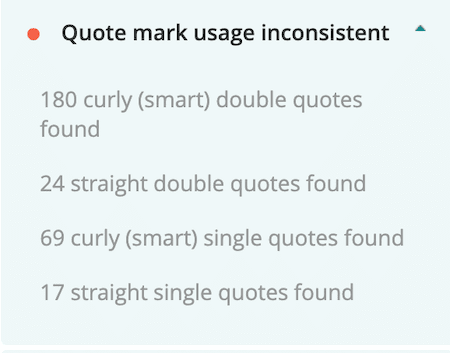
As you can see, my text contains many different-styled quotation marks. But I want all curly double quotes.
It’s easy to quickly change and fix the problem quotation marks by following the links to them in the text.
One of the other problematic errors to find is punctuation outside quotation marks in dialogue.
It can take hours of proofreading and concentration to find them.
But even in a long manuscript, ProWritingAid finds all of the errors for you in the Grammar report.
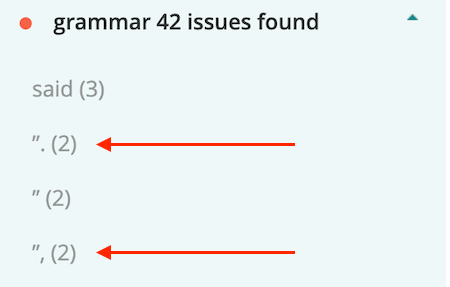
Now, rectifying the four instances in my long text is a simple two-minute fix instead of hours of painstaking proofreading to find them.
Other dialogue issues to check
I’m sure you know that adverbs in dialogue tags are worth limiting.
But how many are in your text?
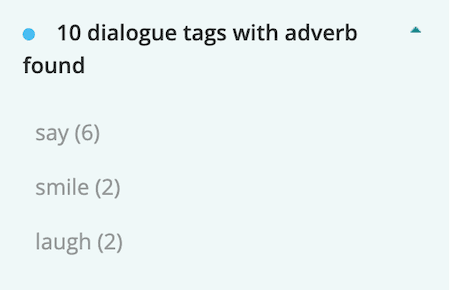
With this report, you can check each occurrence and decide if these adverbs are necessary.
In another report, you can track down adverbs that you used within your dialogue.
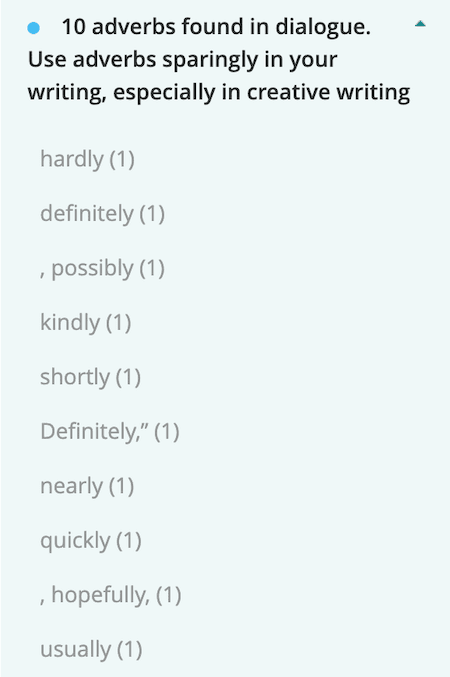
In the list above, there are probably quite a few candidates for the chop.
One other report I always check is unusual dialogue tags.
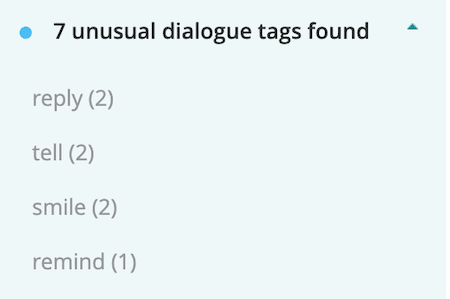
Often, there is a good reason to use these tags, but this report makes it easy to check and confirm that each one is the right choice.
It’s a huge time-saver to check your dialogue writing
You can spend hours, days, or even weeks manually proofreading to find these errors.
Even then, you will miss a few.
But for me, I much prefer to find and fix dialogue errors much faster and more accurately than that.
Checking your dialogue writing with ProWritingAid is always so much faster and easier.
Can you get all these tools and reports with the free version? No.
You need to use the premium version to access the reports highlighted in this article.
But if you value your time, the cost of a subscription is not expensive compared to other premium grammar checkers.
You even have the option to buy a subscription for only one month if you are on a tight budget and only need to check one manuscript before publishing.
Summary
Yes, you have to check all your dialogue writing very carefully.
It’s one of the most tedious tasks in preparing a manuscript for publishing.
Sure, you can trust your eyes and proofread until you hopefully find every error.
But it’s so much faster, easier, and more accurate if you use a quality writing and dialogue checker to help you.
Related reading: How To Write Reported Speech Dialogue Correctly
Share This Article


